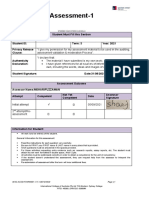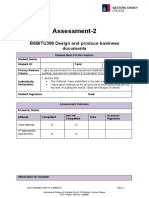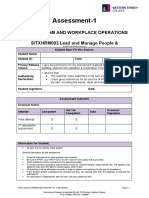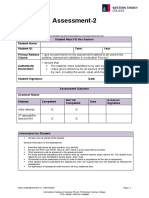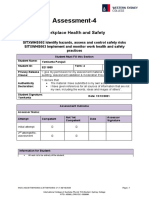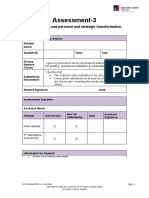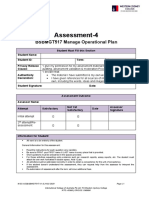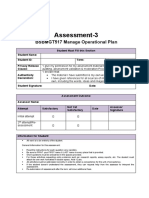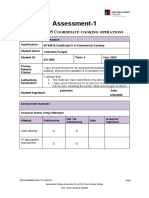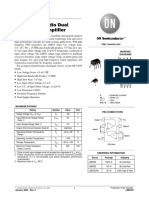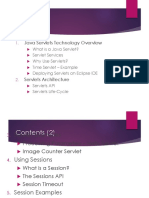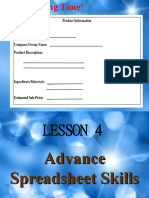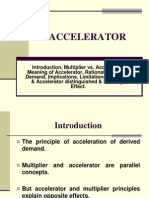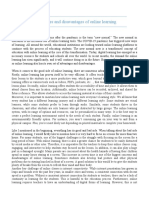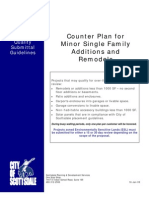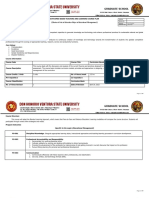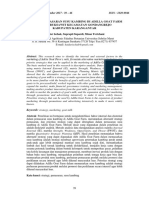Assessment Task-2 V1.1
Assessment Task-2 V1.1
Uploaded by
sapkotabee622Copyright:
Available Formats
Assessment Task-2 V1.1
Assessment Task-2 V1.1
Uploaded by
sapkotabee622Original Description:
Original Title
Copyright
Available Formats
Share this document
Did you find this document useful?
Is this content inappropriate?
Copyright:
Available Formats
Assessment Task-2 V1.1
Assessment Task-2 V1.1
Uploaded by
sapkotabee622Copyright:
Available Formats
Assessment-2
SITXHRM001 COACH OTHERS IN JOB SKILLS
Student Must Fill this Section
Student Name: Bikash Sapkota
Student ID: Term: Year:
S221230
Privacy Release “I give my permission for my assessment material to be used in the auditing,
Clause: assessment validation & moderation Process”.
“I declare that:
Authenticity The material I have submitted is my own work;
Declaration: I have given references for all sources of information that are not my own,
including the words, ideas and images of others”.
Student Signature: Date:2023/08/19
Assessment Outcome
Assessor Name:
Not Yet
Attempt Competent Date Assessor Signature
Competent
Initial attempt
2nd attempt/Re-
assessment
Information for Student:
All work is to be entirely of the student.
General Information for this assessment:
Read the instructions for each question very carefully.
Be sure to PRINT your FIRST name & LAST name in every place that is provided.
Short questions must be answered in the spaces provided.
For those activities requesting extra evidence such as: research reports, essay reports, etc. The student must attach its own
work formatted in double space, Arial 12 pts.
All activities must be addressed correctly in order to obtain a competence for the unit of competency.
If the student doesn’t understand the assessment, they can request help from the assessor to interpret the assessment.
Re-submission of assessment after the term will incur additional fees.
WSC-ASSSITXHRM001 -V1.1-06/10/2020 Page | 1
International College of Australia Pty Ltd T/A Western Sydney College
RTO: 45360 | CRICOS: 03690M
Re-assessment of Result& Academic Appeal procedures:
If a student is not happy with his/ her results, that student may appeal against their grade via a written letter, clearly stating the
grounds of appeal to the Chief Executive Officer. This should be submitted after completion of the subject and within fourteen days of
commencement of the new term.
Re-assessment Process:
An appeal in writing is made to the Academic Manager providing reasons for re-assessment /appeal.
Academic Manager will delegate another member to review the assessment.
The student will be advised of the review result done by another assessor.
If the student is still not satisfied and further challenges the decision, then a review panel is formed comprising the
lecturer/trainer in charge and the Academic Manager or if need be an external assessor.
The Institute will advise the student within 14 days from the submission date of the appeal. The decision of the panel will be
deemed to be final.
If the student is still not satisfied with the result, he / she has the right to seek independent advice or follow external
mediation option with nominated mediation agency.
Any student who fails a compulsory subject or appeals unsuccessfully will be required to re-enrol in that subject.
The cost of reassessment will be borne by the Institute. The external assessor will base his/her judgement based on principles of
assessment. These principles require assessment to be reliable, fair, practical and valid.
Academic Appeals:
If you are dissatisfied with the outcome of the re-evaluation process, you have a right to appeal through academic appeals
handling protocol.
To appeal a decision, the person is required to complete the WSC- Request for Appeal of a Decision form with all other
supporting documents, if any. This form is available via our website. The completed Request for Appeal form is to be
submitted to the Student Support Officer either in hard copy or electronically via the following contact details:
Student Support Officer, Western Sydney College (WSC), 55 High St, Parramatta NSW 2150, Email:
Complaints@wsc.nsw.edu.au
The notice of appeal should be in writing addressed to the Chief Executive Officer and submitted within seven days of
notification of the outcome of the re-evaluation process.
If the appeal is not lodged in the specified time, the result will stand and you must re-enrol in the unit.
In emergency circumstances, such as in cases of serious illness or injury, you must forward a medical certificate in support
of a deferred appeal. The notice of appeal must be made within three working days of the concluding date shown on the
medical certificate.
The decision of Chief Executive Officer will be final.
Student would then have the right to pursue the claim through an independent external body as detailed in the students’
complaint / grievance policy.
Comments/ feedback to student:
WSC-ASSSITXHRM001 -V1.1-06/10/2020 Page | 2
International College of Australia Pty Ltd T/A Western Sydney College
RTO: 45360 | CRICOS: 03690M
Assessment Task 2: Project
TASK SUMMARY
For this task, you must provide effective on-the-job coaching to four different colleagues. There are three parts
to this task:
Part A: You must prepare for coaching and develop a coaching session outline.
Part B: You must implement coaching sessions.
Part C: You must follow up on coaching sessions, seek feedback, and report on the progress of coaching.
RESOURCES AND EQUIPMENT REQUIRED TO COMPLETE THIS TASK:
Access to textbooks and other learning materials
Access to a computer, printer, Internet and email software (if required)
Access to Microsoft Word (or a similar program).
Four colleagues (can be role played by other students).
A workplace or simulated workplace environment.
Access to relevant Commercial Cookery resources and equipment.
Coaching session template (provided). Keep a master copy of this as you will need to complete four in total.
Trainee feedback form (provided). Keep a master copy of this as you will need to complete four in total.
WHEN AND WHERE IS THIS TASK TO BE COMPLETED?
Workplace based students will complete the task in their workplace. Dates and times will need to be
negotiated between the student, the four colleagues and their workplace supervisor.
Classroom based students will complete this task during class time, in a simulated workplace environment.
The assessor will provide students with the date and times that they will be meeting with their trainees
(roles played by other students) and implementing the coaching sessions.
WHAT HAPPENS IF I GET SOMETHING WRONG?
If your assessor identifies that you have completed any part of this task incorrectly and/or have not submitted
all items required, you will be given feedback and a date for resubmission. Your assessor will provide you with
guidance as to what needs to be resubmitted and how.
STUDENT INSTRUCTIONS FOR TASK 2
For this task you must select four colleagues or other students to play the role of ‘trainees’.
You must meet with each trainee and identify one skill/area they wish to improve. For example, this may be
operating equipment, learning a procedure, learning a new cooking method, improving precision cuts and so
on. You are then required to develop a coaching session outline for each trainee.
Once you have developed your coaching session outlines you must implement each coaching session and
report the progress of each trainee to you supervisor (assessor).
Finally, you will answer a series of questions, reflecting on each coaching session, and seek feedback from
each trainee.
WSC-ASSSITXHRM001 -V1.1-06/10/2020 Page | 3
International College of Australia Pty Ltd T/A Western Sydney College
RTO: 45360 | CRICOS: 03690M
TASK 2: PART A – PREPARE FOR COACHING
For this part of the task you must organise a time to meet with each of the four trainees individually.
Talk to each trainee to learn about their current skills and knowledge and identify areas in which they may need
training. Use the following points to guide your discussion:
What is the need for coaching in this situation?
What does this person need to learn?
What are their current skills?
What is their current knowledge?
After each discussion, develop a coaching session outline for each of the trainees, using the template provided.
Your coaching session outline must include:
The trainee’s need for coaching.
A description of the task/skill that you will be teaching the trainee.
When and where the training will occur. (Each coaching session must be delivered to each trainee
individually, at different times.)
Resources required for the coaching session.
Session start time and end time.
A task analysis – you must provide a breakdown of the steps that you will take to teach the trainee the new
task/skill.
SUBMISSION REQUIREMENTS FOR TASK 2, PART A:
Four coaching session outlines – one for each trainee.
WSC-ASSSITXHRM001 -V1.1-06/10/2020 Page | 4
International College of Australia Pty Ltd T/A Western Sydney College
RTO: 45360 | CRICOS: 03690M
Coaching session outline
Trainee name: Bikash Sapkota
Need for coaching: Describe the skills or knowledge that the trainee would like to learn and why.
Ans: Certainly!
In a kitchen setting, a trainee may want to learn a variety of skills
and knowledge to become proficient in cooking and food preparation. Here are
some common skills and knowledge areas:
1. **Knife Skills**: This is fundamental for chopping, dicing, mincing, and various
cutting techniques. It's crucial for efficient and safe food preparation.
2. **Food Safety and Hygiene**: Understanding proper food handling, storage,
and hygiene practices helps prevent foodborne illnesses and ensures a safe
kitchen environment.
3. **Ingredient Identification and Selection**: Learning how to identify different
types of ingredients, their quality, and when to use them can significantly impact
the outcome of a dish.
4. **Cooking Techniques**: These can range from sautéing, grilling, roasting,
boiling, baking, etc. Knowing which technique to use for different ingredients and
dishes is essential.
5. **Recipe Interpretation**: Being able to read and understand recipes is crucial
for replicating dishes accurately.
6. **Flavor Balancing**: Understanding how to balance flavors (sweet, salty, sour,
bitter, umami) is key to creating well-rounded and tasty dishes.
7. **Menu Planning**: Knowing how to plan a balanced menu, considering dietary
restrictions, preferences, and seasonal availability of ingredients.
8. **Time Management**: Efficiently managing time in the kitchen is crucial,
especially when preparing multiple dishes or serving in a restaurant setting.
9. **Kitchen Equipment Proficiency**: Familiarity with various kitchen tools and
appliances is essential for efficient cooking.
10. **Plating and Presentation**: The presentation of a dish is crucial for its
appeal. Learning how to plate dishes attractively is important, especially in a
professional kitchen.
11. **Adaptability and Creativity**: Being able to adapt to different ingredients
and situations, as well as having the creativity to experiment with flavors and
techniques.
Skills/knowledge to be Describe the specific task or skill that you will be teaching the trainee .
taught:
WSC-ASSSITXHRM001 -V1.1-06/10/2020 Page | 5
International College of Australia Pty Ltd T/A Western Sydney College
RTO: 45360 | CRICOS: 03690M
Ans:-Certainly! Let's focus on teaching the trainee the skill of **Knife Handling
and Basic Cuts** in the kitchen. This is a fundamental skill for any cook, as it
forms the basis of food preparation. Here's a breakdown of how you can teach
this skill:
1. **Introduction to Knife Safety**: Begin by emphasizing the importance of
safety. Teach the trainee how to hold a knife properly, with a firm grip but without
gripping too tightly. Emphasize keeping fingers tucked in and away from the
blade.
2. **Knife Selection**: Show the trainee different types of knives commonly used
in the kitchen (e.g., chef's knife, paring knife) and explain their specific uses.
3. **Basic Knife Cuts**:
- **Julienne**: Teach how to cut long, thin strips. This is commonly used for
vegetables like carrots and bell peppers.
- **Brunoise**: Show how to make small, uniform dice. This is useful for
ingredients like garlic or shallots.
- **Dice**: Demonstrate how to cut larger, uniform cubes. This is versatile and
used for various vegetables.
4. **Chopping and Mincing**: Teach techniques for chopping ingredients into
smaller pieces, and how to finely mince herbs or garlic.
5. **Slicing**: Show how to make thin, even slices. This is often used for items
like onions or tomatoes.
6. **Rocking Motion**: Demonstrate the rocking motion used with a chef's knife
for efficient chopping.
7. **Practice and Repetition**: Provide opportunities for the trainee to practice
these cuts with close supervision, emphasizing precision and safety.
8. **Handling Different Ingredients**: Show how the same cut may vary based on
the ingredient being prepared. For instance, how to approach a tomato versus a
potato.
9. **Maintaining and Sharpening Knives**: Teach proper knife care, including
how to clean, store, and regularly sharpen knives for optimal performance.
10. **Safety Reminders**: Regularly remind the trainee about safety practices,
like using a cutting board, keeping work surfaces clean, and being mindful of their
fingers.
11. **Feedback and Correction**: Provide constructive feedback on the trainee's
technique, making sure they understand how to improve.
12. **Application in Recipes**: Incorporate these skills into simple recipes,
allowing the trainee to practice in a practical context..
WSC-ASSSITXHRM001 -V1.1-06/10/2020 Page | 6
International College of Australia Pty Ltd T/A Western Sydney College
RTO: 45360 | CRICOS: 03690M
Where the training will The Rose Garden Cafe
occur:
Resources required: List all of the equipment and resources required for the coaching session.
Ans:- Certainly!
Here is a list of essential equipment and resources you will need
for a coaching session focused on teaching knife handling and basic cuts in a
kitchen:
1. **Chef's Knife**: A good quality chef's knife is essential for various cutting
techniques.
2. **Paring Knife**: Useful for more delicate tasks like peeling and precise
cutting.
3. **Cutting Board**: Provide a sturdy, non-slip cutting board large enough to
comfortably work on.
4. **Knife Sharpener or Honing Rod**: Ensure the knives are sharp for safe and
efficient cutting.
5. **Kitchen Towels or Cloth**: For wiping down surfaces and keeping hands dry.
6. **Safety Gloves (Optional)**: Especially useful for beginners to prevent
accidental cuts.
7. **Vegetables and Fruits**: Provide a variety of produce for the trainee to
practice different cuts.
8. **Bowls or Containers**: For holding chopped ingredients.
9. **Trash Bin or Compost Bin**: For disposing of scraps and waste.
10. **Sink and Dish Soap**: For cleaning knives and cutting surfaces.
11. **First Aid Kit**: Always have one on hand in case of minor cuts or accidents.
12. **Instructional Materials**: If you have any diagrams, handouts, or visual aids
to supplement your teaching.
13. **Camera or Video Device (Optional)**: Useful for recording demonstrations
or for providing visual feedback to the trainee.
14. **Timer or Clock**: Helpful for time management during practice sessions.
15. **Apron (Optional)**: Keeps clothing clean and protected.
WSC-ASSSITXHRM001 -V1.1-06/10/2020 Page | 7
International College of Australia Pty Ltd T/A Western Sydney College
RTO: 45360 | CRICOS: 03690M
16. **Notebook and Pen**: For the trainee to take notes and jot down important
tips.
17. **Kitchen Environment**: Ensure a clean, well-lit, and organized kitchen
space.
18. **Water and Snacks**: Keep the trainee hydrated and energized during the
session.
Date of coaching session: 2023/10/26
Session start time:
10:00pm
Task analysis: Provide a breakdown of the steps to teach the student the task.
Certainly! Here's a breakdown of steps to teach a student the task of Knife
Ans:-
Handling and Basic Cuts in a kitchen:
1. **Introduction to Knife Safety**:
- Explain the importance of knife safety and proper handling techniques.
- Emphasize the need to keep fingers tucked in and away from the blade.
2. **Knife Selection**:
- Introduce different types of knives (e.g., chef's knife, paring knife) and explain
their specific uses.
3. **Demonstration**:
- Begin with a demonstration of each basic cut: julienne, brunoise, dice, chop,
mince, and slice.
4. **Hands-On Practice**:
- Provide the student with a chef's knife and guide them through each cut,
starting with the julienne.
5. **Repetition and Correction**:
- Encourage the student to repeat each cut multiple times, offering corrections
and feedback as needed.
6. **Safety Reminders**:
- Periodically remind the student about safety practices, such as using a cutting
board and keeping work surfaces clean.
7. **Handling Different Ingredients**:
WSC-ASSSITXHRM001 -V1.1-06/10/2020 Page | 8
International College of Australia Pty Ltd T/A Western Sydney College
RTO: 45360 | CRICOS: 03690M
- Show the student how the same cut may vary based on the ingredient being
prepared.
8. **Technique Refinement**:
- Focus on refining the student's technique for each type of cut, ensuring
consistency and precision.
9. **Proper Grip and Motion**:
- Pay special attention to the grip and motion required for each cut,
emphasizing the rocking motion for chopping.
10. **Knife Care and Maintenance**:
- Teach the student how to clean, store, and regularly sharpen knives for
optimal performance.
11. **Application in Recipes**:
- Integrate the learned skills into simple recipes, allowing the student to
practice in a practical context.
12. **Review and Feedback**:
- At the end of the session, review the cuts learned and provide constructive
feedback on the student's technique.
13. **Q&A and Recap**:
- Allow time for the student to ask questions or seek clarification on any aspect
of the skill being taught.
14. **Practice Assignments**:
- Provide the student with assignments or exercises to practice these skills on
their own.
15. **Encourage Practice and Patience**:
- Remind the student that proficiency in knife skills takes time and practice.
Encourage them to continue practicing outside of the coaching session.
Session end time: 4:00pm
WSC-ASSSITXHRM001 -V1.1-06/10/2020 Page | 9
International College of Australia Pty Ltd T/A Western Sydney College
RTO: 45360 | CRICOS: 03690M
TASK 2: PART B – IMPLEMENT COACHING SESSIONS
This part of the task requires you to implement each of your coaching sessions. Your assessor will observe you
as you individually coach each of your four trainees.
Meet with each trainee in your specified training location. Make sure you have all the resources you need to
ensure each session runs smoothly.
At the beginning of each coaching session you must:
explain the purpose of the coaching session to your trainee.
tell them about the workplace procedures relevant to the task (for example, if you are getting them to
clean kitchen equipment, there would be procedures related to PPE, hazardous substances, food
safety etc.).
During each coaching session you must follow the principles of training by doing the following:
giving the trainee a detailed description about what you will be showing them (explanation).
doing the task and telling them about the knowledge required (demonstration).
when you have finished the task, briefly describing/summarising again how you did it (reviewing).
asking the trainee to confirm their understanding of what they have to do, including asking any
questions to clarify concerns (trainee explanation).
getting the trainee to demonstrate the task and watching how they do it.
when the trainee has finished the task, talking to them about what you observed – giving them
constructive feedback and making sure you identify areas where they did well (feedback).
Once you have completed each coaching session you must:
watch the trainee do this task at least two more times.
give them some help if you see they are having difficulties.
report their progress to your supervisor (workplace-based students) or your assessor (classroom-based
students).
Classroom based students will be observed completing each coaching session during class time, in a simulated
workplace environment.
If you are completing your coaching sessions in a real workplace, your assessor will visit you in the workplace
or you may provide video recorded footage of each of your coaching sessions. Discuss these options with your
assessor, including appropriate recording devices and method of submission (USB, email etc.)
During each coaching session your assessor will be looking to see that you:
explain the purpose for coaching
demonstrate specific skills
apply techniques to establish a rapport with the trainee
show sensitivity to the trainee (for example, if they become frustrated or upset with the task they are doing,
or keep making mistakes)
use appropriate communication techniques, including active listening and open questioning
provide the trainee with the opportunity to practice
provide constructive feedback
complete the coaching within the allocated timeframe
apply the key principles of learning.
SUBMISSION REQUIREMENTS FOR TASK 2, PART B:
You do not need to submit anything for this task.
WSC-ASSSITXHRM001 -V1.1-06/10/2020 Page | 10
International College of Australia Pty Ltd T/A Western Sydney College
RTO: 45360 | CRICOS: 03690M
TASK 2: PART C – REFLECTION
Ask each of your trainees to fill out the feedback form (provided) after their coaching sessions.
After each training session, answer the following reflective questions:
1. Do you think you allocated enough time to the session?
2. Did you demonstrate the tasks properly?
3. Do you think the trainee had difficulty understanding what you did and how you explained it? Explain
why or why not.
4. What made you realise the trainee was struggling?
5. If you could not help the trainee with something, who would you call on for assistance?
6. What did you get out of the trainee’s feedback? Is there anything you disagree with?
7. What changes could you make if you had to coach someone else in the same tasks in the future?
Type your answers in a Microsoft Word document or similar and submit to your assessor, along with trainee
feedback forms.
SUBMISSION REQUIREMENTS FOR TASK 2, PART C:
Your answers to the reflective questions, for each of the four coaching sessions.
Trainee feedback forms (four in total).
WSC-ASSSITXHRM001 -V1.1-06/10/2020 Page | 11
International College of Australia Pty Ltd T/A Western Sydney College
RTO: 45360 | CRICOS: 03690M
ASSESSMENT TASK 2: PROJECT
PART A: PREPARE FOR COACHING Yes No
Did the student submit the following: *
¨ Trainee 1- Coaching Session Outline
¨ Trainee 2- Coaching Session Outline
¨ Trainee 3- Coaching Session Outline
¨ Trainee 4- Coaching Session Outline
Did the student have a discussion with Trainee 1 and develop an appropriate coaching session outline? *
Identified the trainee’s Identified and planned Allocated appropriate
need for coaching task/skill to teach the time frames for coaching
trainee session (within
commercial time
constraints)
Identified resources Developed task
required for coaching analysis (breakdown of
session the steps to teach new
skill)
Did the student have a discussion with Trainee 2 and develop an appropriate coaching session outline? *
Identified the trainee’s Identified and planned Allocated appropriate
need for coaching task/skill to teach the time frames for coaching
trainee session (within
commercial time
constraints)
Identified resources Developed task
required for coaching analysis (breakdown of
session the steps to teach new
skill)
Did the student have a discussion with Trainee 3 and develop an appropriate coaching session outline? *
Identified the trainee’s Identified and planned Allocated appropriate
need for coaching task/skill to teach the time frames for coaching
trainee session (within
commercial time
constraints)
Identified resources Developed task
required for coaching analysis (breakdown of
session the steps to teach new
skill)
Did the student have a discussion with Trainee 4 and develop an appropriate coaching session outline? *
Identified the trainee’s Identified and planned Allocated appropriate
need for coaching task/skill to teach the time frames for coaching
trainee session (within
commercial time
constraints)
Identified resources Developed task
required for coaching analysis (breakdown of
session the steps to teach new
skill)
Please note any reasonable adjustments for this task below.
¨ I have reviewed the mapping to this task.
WSC-ASSSITXHRM001 -V1.1-06/10/2020 Page | 12
International College of Australia Pty Ltd T/A Western Sydney College
RTO: 45360 | CRICOS: 03690M
PART A: PREPARE FOR COACHING Yes No
¨ I have analysed the evidence gathered against the requirements of this task and am satisfied that the student has
satisfactorily demonstrated the skills and knowledge required of this unit.
Where any items above are marked ‘No’, please provide comments and outline the gaps below. Ensure feedback is
provided to the student on their Assessment Task Cover Sheet. Note actions that will be taken to correct the gaps.
How many attempts were required to demonstrate satisfactory performance? ________________________________
WSC-ASSSITXHRM001 -V1.1-06/10/2020 Page | 13
International College of Australia Pty Ltd T/A Western Sydney College
RTO: 45360 | CRICOS: 03690M
PART B: IMPLEMENT COACHING SESSION
Coaching session Coaching session Coaching session Coaching session
Observations: 1 2 3 4
Did the student… Yes No Yes No Yes No Yes No
Explain the purpose for coaching?
Discussed need for coaching Explained how the session will assist * * * *
trainee to acquire new skills
Demonstrate specific skills?
* * * *
Demonstrated skill/task step by step Explained what they were doing
during demonstration
Apply techniques to establish a rapport with the trainee?
Used the trainee’s name when Used positive body language, smiled
* * * *
addressing them etc.
Listened carefully and attentively
Show sensitivity to the trainee?
Showed empathy Was culturally appropriate * * * *
Showed patience and understanding
Use appropriate communication techniques?
Used active listening techniques Asked open questions
* * * *
Used culturally appropriate language Spoke clearly, at an appropriate
volume
Apply the key principles of learning?
Provided an explanation of how Provided a demonstration
to do the task
Reviewed the explanation and Asked the trainee to explain * * * *
demonstration what they have learnt
Provided the trainee with
feedback
Provide trainee with the opportunity to practice?
Provide constructive feedback?
WSC-ASSSITXHRM001 -V1.1-06/10/2020 Page | 14
International College of Australia Pty Ltd T/A Western Sydney College
RTO: 45360 | CRICOS: 03690M
PART B: IMPLEMENT COACHING SESSION
Coaching session Coaching session Coaching session Coaching session
Observations: 1 2 3 4
Complete the coaching within allocated timeframe?
WSC-ASSSITXHRM001 -V1.1-06/10/2020 Page | 15
International College of Australia Pty Ltd T/A Western Sydney College
RTO: 45360 | CRICOS: 03690M
Comments:
Please add any feedback to the student about these tasks on the Assessment Cover Sheet. Keep a copy of the completed Assessment Task Cover S
Please note any reasonable adjustments made for this task below.
Coaching session 1 Outcome: Satisfactory Not Satisfactory Date
Coaching session 2 Outcome: Satisfactory Not Satisfactory Date
Coaching session 3 Outcome: Satisfactory Not Satisfactory Date
Coaching session 4 Outcome: Satisfactory Not Satisfactory Date
Trainer/assessor name: Trainer/assessor signature:
PART C: REFLECTION Yes No
Did the student submit the following: *
¨ Answers to reflective questions and trainee feedback form –Coaching session 1
¨ Answers to reflective questions and trainee feedback form –Coaching session 2
¨ Answers to reflective questions and trainee feedback form –Coaching session 3
¨ Answers to reflective questions and trainee feedback form –Coaching session 4
Did the student accurately follow up on each coaching session? *
Identified Identified difficulties Reported on trainee
performance problems with coaching progress
Sought feedback on
coaching sessions from
trainees
Please note any reasonable adjustments for this task below.
¨ I have reviewed the mapping to this task.
¨ I have analysed the evidence gathered against the requirements of this task and am satisfied that the student has
satisfactorily demonstrated the skills and knowledge required of this unit.
Where any items above are marked ‘No’, please provide comments and outline the gaps below. Ensure feedback is
provided to the student on their Assessment Task Cover Sheet. Note actions that will be taken to correct the gaps.
WSC-ASSSITXHRM001 -V1.1-06/10/2020 Page | 16
International College of Australia Pty Ltd T/A Western Sydney College
RTO: 45360 | CRICOS: 03690M
PART C: REFLECTION Yes No
How many attempts were required to demonstrate satisfactory performance? ________________________________
WSC-ASSSITXHRM001 -V1.1-06/10/2020 Page | 17
International College of Australia Pty Ltd T/A Western Sydney College
RTO: 45360 | CRICOS: 03690M
WSC-ASSSITXHRM001 -V1.1-06/10/2020 Page | 18
International College of Australia Pty Ltd T/A Western Sydney College
RTO: 45360 | CRICOS: 03690M
You might also like
- SITXMGT005 Student Assessment TasksDocument17 pagesSITXMGT005 Student Assessment TasksTainara Silva50% (2)
- SITXCCS007 Assessment Task 2Document10 pagesSITXCCS007 Assessment Task 2Deepika Bhandari0% (2)
- Advanced Technical Analysis A Guide To High Probability Trading by Aligning With Smart MoneyDocument113 pagesAdvanced Technical Analysis A Guide To High Probability Trading by Aligning With Smart MoneyShaowalit Gamter100% (4)
- BSBLDR602 Assessment-Task-2Document18 pagesBSBLDR602 Assessment-Task-2Rupesh AdhikariNo ratings yet
- Secretary's Certificate - To Open AccountDocument5 pagesSecretary's Certificate - To Open AccountNorhian AlmeronNo ratings yet
- Revised Incident Record FormDocument2 pagesRevised Incident Record FormRafael Juico100% (4)
- Assessment-3: Bsbsus511 DDocument12 pagesAssessment-3: Bsbsus511 DHira Raza0% (1)
- Assessment Task 2Document15 pagesAssessment Task 2Hira Raza0% (2)
- Assessment Task-1 V1.1Document9 pagesAssessment Task-1 V1.1Nidhi GuptaNo ratings yet
- BSBITU306Assessment-2 V 1.3Document12 pagesBSBITU306Assessment-2 V 1.3Aryan Singla100% (1)
- BSBITU306Assessment-3 V 1.3Document11 pagesBSBITU306Assessment-3 V 1.3Aryan Singla0% (1)
- Assessment-1: Bsbdiv501 Manage Diversity in The WorkplaceDocument10 pagesAssessment-1: Bsbdiv501 Manage Diversity in The WorkplaceNitin100% (1)
- Assessment-Task-1 (2) For Prepare Stocks Sauces and SoupsDocument15 pagesAssessment-Task-1 (2) For Prepare Stocks Sauces and SoupsTuba MirzaNo ratings yet
- Individual Task: Ayman I. Mohadali BSMT - 1Document5 pagesIndividual Task: Ayman I. Mohadali BSMT - 1Sheima Ainie JuripaeNo ratings yet
- Winsev6 UsDocument15 pagesWinsev6 Usothman okNo ratings yet
- Assessment Task-2 V1.1Document18 pagesAssessment Task-2 V1.1Nidhi GuptaNo ratings yet
- Assessment-3: Manage Team and Workplace Operations SITXHRM003 Lead and Manage People &Document9 pagesAssessment-3: Manage Team and Workplace Operations SITXHRM003 Lead and Manage People &3 PNo ratings yet
- Assessment-2 V 1.1Document12 pagesAssessment-2 V 1.1endy jakNo ratings yet
- Assessment Task-3Document6 pagesAssessment Task-3Parash RijalNo ratings yet
- Assessment Task-1 V1.1Document9 pagesAssessment Task-1 V1.1Nidhi GuptaNo ratings yet
- Assessment-1 V 1.1Document27 pagesAssessment-1 V 1.13 P100% (1)
- Assessment-2: Manage Team and Workplace Operations SITXHRM003 Lead and Manage People &Document7 pagesAssessment-2: Manage Team and Workplace Operations SITXHRM003 Lead and Manage People &3 P100% (1)
- Assessment Task-2Document7 pagesAssessment Task-2Parash RijalNo ratings yet
- Assessment-Task-1 SITHCCC020 Yamkanta ParajuliDocument12 pagesAssessment-Task-1 SITHCCC020 Yamkanta Parajulinirajan parajuliNo ratings yet
- Assessment Task-1Document10 pagesAssessment Task-1Parash RijalNo ratings yet
- SITHCCC020 Task 2 Yamkanta ParajuliDocument10 pagesSITHCCC020 Task 2 Yamkanta Parajulinirajan parajuliNo ratings yet
- Assessment Task-4Document6 pagesAssessment Task-4nirajan parajuliNo ratings yet
- Revised Sustainability Improvement ReportDocument17 pagesRevised Sustainability Improvement ReportÇrox Rmg PunkNo ratings yet
- Assessment 1 paraDocument10 pagesAssessment 1 paranirajan parajuliNo ratings yet
- Assessment Task 3Document13 pagesAssessment Task 3Jenish MaharjanNo ratings yet
- Assessment-1: Sithkop002 Plan and Cost Basic Menus Sithkop004 Develop Menus For Special Dietary RequirementsDocument15 pagesAssessment-1: Sithkop002 Plan and Cost Basic Menus Sithkop004 Develop Menus For Special Dietary Requirementsnirajan parajuliNo ratings yet
- SITHPAT006 Produce Desserts CompletedDocument13 pagesSITHPAT006 Produce Desserts CompletedPadam DangalNo ratings yet
- SITHCCC005 SITHCCC018 Assessment Task 1Document17 pagesSITHCCC005 SITHCCC018 Assessment Task 1nirajan parajuliNo ratings yet
- SITXCCS016 Student Assessment TasksDocument40 pagesSITXCCS016 Student Assessment TasksSujal Kutal0% (2)
- Report of Assessment 3Document29 pagesReport of Assessment 3Susanta BhujelNo ratings yet
- Assessment-4 V 1.6Document16 pagesAssessment-4 V 1.6nehaNo ratings yet
- Assessment Task-3 V1.1Document8 pagesAssessment Task-3 V1.1Nidhi Gupta50% (2)
- Assessment-3 V 1.6Document18 pagesAssessment-3 V 1.6nehaNo ratings yet
- Assessment Task 1 SITXHRM008Document24 pagesAssessment Task 1 SITXHRM008sunuwarrajesh9No ratings yet
- BSBTWK502 Student Assessment Tasks (Task 1)Document11 pagesBSBTWK502 Student Assessment Tasks (Task 1)yashika290% (1)
- KII5021 Professional Development Assessment Task 1Document8 pagesKII5021 Professional Development Assessment Task 1klm klmNo ratings yet
- BSBOPS403 Student Assessment V 3.0 Assessment 1 Only..Document23 pagesBSBOPS403 Student Assessment V 3.0 Assessment 1 Only..jkaccessories58No ratings yet
- SITXHRM008 Student Assessment TasksDocument26 pagesSITXHRM008 Student Assessment Tasksmohammed.khan1140No ratings yet
- Assessment Task 1.1Document13 pagesAssessment Task 1.1Fahad AhmadNo ratings yet
- Assessment Task 1.2Document14 pagesAssessment Task 1.2Fahad AhmadNo ratings yet
- Assessment 3 F-1Document11 pagesAssessment 3 F-1karma Sherpa100% (1)
- BSBTWK502 Project Portfolio (Task 2)Document18 pagesBSBTWK502 Project Portfolio (Task 2)yashika29No ratings yet
- Assessment Task 1Document17 pagesAssessment Task 1Rohan ShresthaNo ratings yet
- Assessment Task 1Document14 pagesAssessment Task 1Jenish MaharjanNo ratings yet
- BSBWHS616 Student Assessment Tasks (Task 1)Document16 pagesBSBWHS616 Student Assessment Tasks (Task 1)marufmostofa0No ratings yet
- BSBOPS601 Student Assessment Tasks 001Document26 pagesBSBOPS601 Student Assessment Tasks 001mahidkazi7No ratings yet
- MAHENDRA S221062 ICTICT526 Assessment-Task-2Document91 pagesMAHENDRA S221062 ICTICT526 Assessment-Task-2EmperorNo ratings yet
- BSBWHS616 Student Assessment Tasks (Task 1) WorkingDocument17 pagesBSBWHS616 Student Assessment Tasks (Task 1) Workingmarufmostofa0No ratings yet
- Assessment-Task-1 SITHKOP005 Yamkanta ParajuliDocument22 pagesAssessment-Task-1 SITHKOP005 Yamkanta Parajulinirajan parajuliNo ratings yet
- Report of Assessment 5Document12 pagesReport of Assessment 5Susanta BhujelNo ratings yet
- SITHCCC027 Student Assessment TasksDocument26 pagesSITHCCC027 Student Assessment Taskscrypto.ronakNo ratings yet
- BSBLDR602 Assessment-Task-1Document10 pagesBSBLDR602 Assessment-Task-1Rupesh AdhikariNo ratings yet
- Assessment-Task-1 SITHCCC041Document25 pagesAssessment-Task-1 SITHCCC041sunuwarrajesh9No ratings yet
- Assessment-2: Sithkop002 Plan and Cost Basic Menus Sithkop004 Develop Menus For Special Dietary RequirementsDocument18 pagesAssessment-2: Sithkop002 Plan and Cost Basic Menus Sithkop004 Develop Menus For Special Dietary Requirementsnirajan parajuli0% (1)
- Assessment Task-2 V1.1 YamkantaDocument7 pagesAssessment Task-2 V1.1 Yamkantanirajan parajuliNo ratings yet
- SITXMGT005 Project Portfolio TemplateDocument30 pagesSITXMGT005 Project Portfolio TemplateTainara SilvaNo ratings yet
- SITHCCC031 Student Assessment TasksDocument30 pagesSITHCCC031 Student Assessment TasksSujal KutalNo ratings yet
- Structure Maintainer Trainee, Group C (Iron Work): Passbooks Study GuideFrom EverandStructure Maintainer Trainee, Group C (Iron Work): Passbooks Study GuideNo ratings yet
- Construction Supervisor II: Passbooks Study GuideFrom EverandConstruction Supervisor II: Passbooks Study GuideNo ratings yet
- lm833 Rev2 PDFDocument8 pageslm833 Rev2 PDFPhong DoNo ratings yet
- A New Era of Currency Derivatives Market in India: Dr. E.V.P.A.S.PallaviDocument5 pagesA New Era of Currency Derivatives Market in India: Dr. E.V.P.A.S.PallavirommelNo ratings yet
- Java Servlets 110317050338 Phpapp01 PDFDocument57 pagesJava Servlets 110317050338 Phpapp01 PDFsakshamNo ratings yet
- ESMC2018 Technical Program Web 0 PDFDocument291 pagesESMC2018 Technical Program Web 0 PDFSenthilkumar VNo ratings yet
- TJ33PE5A (400 VAC) TJ33PE5A (400 VAC) : 50 HZ 50 HZ Diesel Generator Sets Diesel Generator SetsDocument4 pagesTJ33PE5A (400 VAC) TJ33PE5A (400 VAC) : 50 HZ 50 HZ Diesel Generator Sets Diesel Generator SetsAhsan FazalNo ratings yet
- Advance SpreadsheetDocument20 pagesAdvance SpreadsheetAnna RowenaNo ratings yet
- 13 - INI Design Studio - Lotus VillaDocument11 pages13 - INI Design Studio - Lotus VillaSneha PatilNo ratings yet
- VLSI Design Automation of A Montgomery Multiplier Using Astro by ...Document24 pagesVLSI Design Automation of A Montgomery Multiplier Using Astro by ...Ramya ScNo ratings yet
- Top 25 MS Excel FormulasDocument28 pagesTop 25 MS Excel Formulasmagh21124.adNo ratings yet
- Quality Failures That Shook The World - FordDocument2 pagesQuality Failures That Shook The World - FordSyahril Aizal AhmadNo ratings yet
- Liebert Exs 10 20 Kva Brochure EnglishDocument8 pagesLiebert Exs 10 20 Kva Brochure Englishenrique espichan coteraNo ratings yet
- Purification of Free Lutein From Marigold Flowers by Liquid ChromatographyDocument12 pagesPurification of Free Lutein From Marigold Flowers by Liquid ChromatographyGanga DharanNo ratings yet
- Investment Function - AcceleratorDocument14 pagesInvestment Function - AcceleratorSmita KadianNo ratings yet
- Tour Report On Samtse-Sipsoo RoadDocument35 pagesTour Report On Samtse-Sipsoo RoadSonam TsheringNo ratings yet
- CS252 Slides NewDocument642 pagesCS252 Slides NewAlice YewNo ratings yet
- Pros and Cons EssayDocument2 pagesPros and Cons EssayLeta KuciNo ratings yet
- This Paper Is Not To Be Removed From The Examination HallDocument55 pagesThis Paper Is Not To Be Removed From The Examination HallSithmi HimashaNo ratings yet
- Scottsdale - Residential Plan RequirementsDocument23 pagesScottsdale - Residential Plan Requirementsnacnac238No ratings yet
- SPN 157 CircuitDocument5 pagesSPN 157 Circuitabdelrhmangbr86No ratings yet
- ERROR E03 EngDocument3 pagesERROR E03 EngСергей Калихов100% (1)
- Students' Login & Password For PMS SystemDocument26 pagesStudents' Login & Password For PMS SystemDiana ZholdubaevaNo ratings yet
- OBE Course Syllabus Curriculum Devt MAED EM Revised - 2022 1Document15 pagesOBE Course Syllabus Curriculum Devt MAED EM Revised - 2022 1Nojla SenoirbNo ratings yet
- JJRC h8c DFD User ManualDocument6 pagesJJRC h8c DFD User ManualManuelNo ratings yet
- Ischak 2017Document8 pagesIschak 2017RochmahAiNurNo ratings yet
- Masina de BrodatDocument2 pagesMasina de BrodatCristinaNo ratings yet








